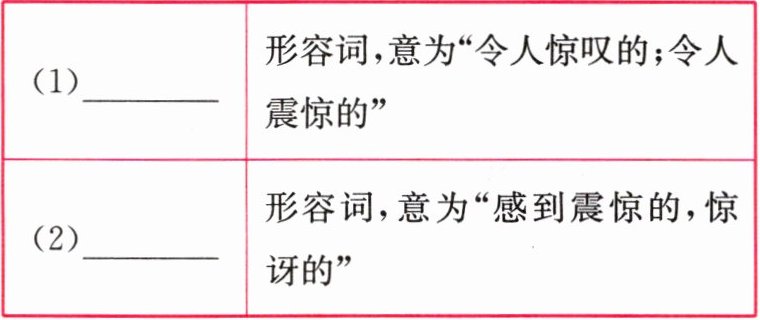Peter wants to know something about Flora’s new school. If you are Flora(假设你是弗洛拉), please write an email to Peter.
```mindmap
Hi Peter,
Thanks for your email. Your school sounds great! My new school is ______.
There’s ______. It’s ______. ______ is ______. We ______.
Yours,
Flora
```
```mindmap
Hi Peter,
Thanks for your email. Your school sounds great! My new school is ______.
There’s ______. It’s ______. ______ is ______. We ______.
Yours,
Flora
```
答案:Hi Peter,
Thanks for your email. Your school sounds great! My new school is big and beautiful.
There’s a large playground. It’s in front of the teaching building. The library is quiet. We often read books there.
Yours,
Flora
Thanks for your email. Your school sounds great! My new school is big and beautiful.
There’s a large playground. It’s in front of the teaching building. The library is quiet. We often read books there.
Yours,
Flora
1. do exercises
【感知】
» All the students go there and do exercises together in the morning.(教材第40页)所有学生在早上去那里一起做体操。
» I often do exercise with my friends after school. 我放学后经常和朋友一起锻炼。
» We exercise about one hour at school every day. 我们每天在学校大约锻炼一个小时。
【探究】
(1)exercise作
(2)exercise作
(3)exercise作动词,意为“
【应用】
【感知】
» All the students go there and do exercises together in the morning.(教材第40页)所有学生在早上去那里一起做体操。
» I often do exercise with my friends after school. 我放学后经常和朋友一起锻炼。
» We exercise about one hour at school every day. 我们每天在学校大约锻炼一个小时。
【探究】
(1)exercise作
可数
(可数/不可数)名词,表示“一套动作,练习”。(2)exercise作
不可数
(可数/不可数)名词,表示“活动,锻炼”,常和take、do、get等连用。(3)exercise作动词,意为“
锻炼
”。【应用】
答案:
(1)可数
(2)不可数
(3)锻炼
(1)可数
(2)不可数
(3)锻炼
①做眼保健操是保护我们视力的一种好方法。
Doing
②他的爸爸有时候在家附近的公园做锻炼。
His father sometimes
(2)用所给单词的适当形式填空
My grandfather often
Doing
eye
exercises
is a good way to protect our eyesight.②他的爸爸有时候在家附近的公园做锻炼。
His father sometimes
does
some exercise
in the park near his home.(2)用所给单词的适当形式填空
My grandfather often
exercises
(exercise)in the morning.答案:①eye exercises ②does;exercise
(2)exercises
(2)exercises
2. amazing
【感知】
» It’s amazing!(教材第40页)令人震惊!
» He is amazed at the news. 他对这个消息感到震惊。
【探究】

【应用】
用所给单词的适当形式填空
①She is
②What an
【感知】
» It’s amazing!(教材第40页)令人震惊!
» He is amazed at the news. 他对这个消息感到震惊。
【探究】

【应用】
用所给单词的适当形式填空
①She is
amazed
(amaze)at the changes.②What an
amazing
(amaze)girl she is!答案:
(1)amazing
(2)amazed ①amazed ②amazing
(1)amazing
(2)amazed ①amazed ②amazing
3. most
【感知】
» We spend most of the time in our classroom.(教材第40页)我们大部分时间都在教室里度过。
» Most of the students in the class are from China. 班上大部分学生都来自中国。
» Most people like apples. 大多数人喜欢苹果。
【探究】
(1)most作代词,意为“大多数;大部分”;most of...表示……“的大多数/大部分”,后接名词或代词。most of...作主语时,谓语动词的单复数形式跟of后的名词或代词的数保持一致。
(2)most作形容词,意为“大多数;大部分”,后面接名词。
【应用】
用所给单词的适当形式填空
①Most of
②Most
③Most of the rooms
【感知】
» We spend most of the time in our classroom.(教材第40页)我们大部分时间都在教室里度过。
» Most of the students in the class are from China. 班上大部分学生都来自中国。
» Most people like apples. 大多数人喜欢苹果。
【探究】
(1)most作代词,意为“大多数;大部分”;most of...表示……“的大多数/大部分”,后接名词或代词。most of...作主语时,谓语动词的单复数形式跟of后的名词或代词的数保持一致。
(2)most作形容词,意为“大多数;大部分”,后面接名词。
【应用】
用所给单词的适当形式填空
①Most of
them
(they)want to have a picnic.②Most
children
(child)like going out at weekends.③Most of the rooms
face
(face)the sea.答案:①them ②children ③face